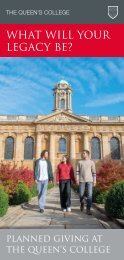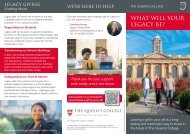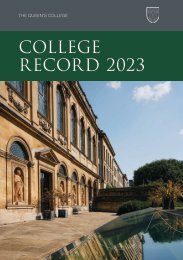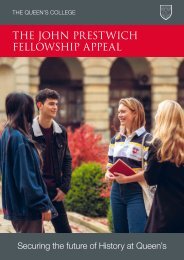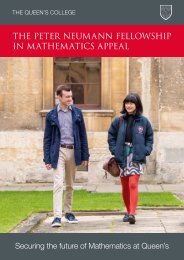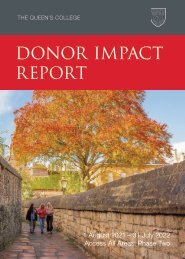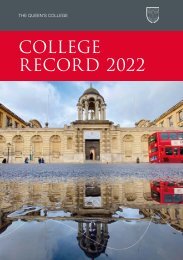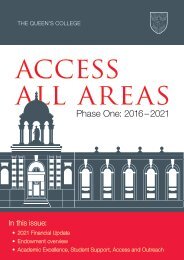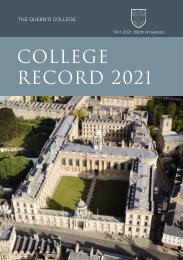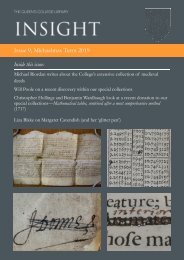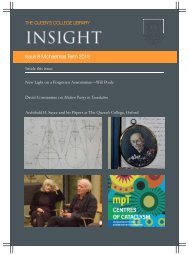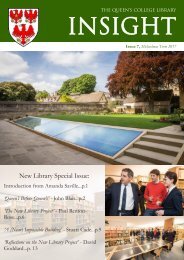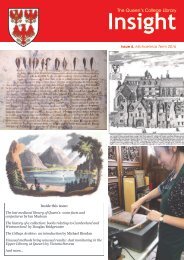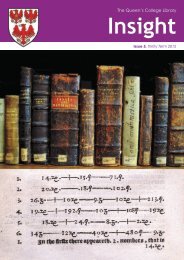Eagle Eye Magazine Issue 1 2023
Take a dive into the research and work that's going on at The Queen's College and beyond its walls within the community of Old Members. In issue one, we celebrate Shakespeare's First Folio, ask our history Fellows what makes them passionate about their subject, explore the new accessible Porters' Lodge, ask a current student about how to engage positively with climate issues, and much more.
Take a dive into the research and work that's going on at The Queen's College and beyond its walls within the community of Old Members. In issue one, we celebrate Shakespeare's First Folio, ask our history Fellows what makes them passionate about their subject, explore the new accessible Porters' Lodge, ask a current student about how to engage positively with climate issues, and much more.
Create successful ePaper yourself
Turn your PDF publications into a flip-book with our unique Google optimized e-Paper software.
ecause, unlike so many other people of African ancestry brought<br />
to England as a curiosity, Amelia survives. And she survives at<br />
least into her 50s. I know this may not seem like much, but you<br />
have to understand that I am so often confronted with Black lives<br />
cut short in the archives.<br />
What can we learn about wider<br />
social changes from examining the<br />
everyday lives of individuals?<br />
I am interested in the ways in which<br />
people are able to live within social<br />
structures that are very oppressive,<br />
that are meant to keep them in a<br />
subjugated position, that devalue their<br />
lives. I am thinking here specifically<br />
of Black lives, poor lives, the lives of<br />
the socially marginalised. I’m also<br />
interested in the legacies of these<br />
structures and systems we assume to<br />
have ended because there have been<br />
changes in the law but are still present.<br />
By looking at things on a macro level,<br />
you think you can see big changes<br />
but by looking at individuals you see<br />
what those changes mean, or don’t<br />
mean, and you start to see how little<br />
might have actually changed. As a socio-cultural historian, it can<br />
be frustrating to see this – you see how things are articulated<br />
differently but the intrinsic ideas are still there.<br />
What aspects of Caribbean research methodologies do you<br />
draw upon in your work?<br />
I’m particularly interested in a Caribbean research methodology<br />
that draws on storytelling as a key part of the process and sitting<br />
with multiple, sometimes contradictory, interpretations, different<br />
ways of seeing and understanding. It puts me in mind of the<br />
way my parents relayed history when I was young. It was told<br />
almost parable-style with one message cloaked in another. They<br />
were giving me and my siblings tools from the past to use in<br />
the present. One of my forthcoming projects is to bring people<br />
together from different generations to ‘lime’ (to chat) and share<br />
stories or rather, their own interpretations of the past and its<br />
legacies. It’s more than information-sharing, it’s also different<br />
ways of communicating the feelings of the past, of what it meant,<br />
and continues to mean. And in doing this, articulating what we<br />
hope and imagine for the future.<br />
What do you most enjoy about teaching history?<br />
The joy of seeing someone encountering something for the<br />
first time. It’s incredibly rewarding to see students develop<br />
intellectually over the course of one term, let alone their whole<br />
degree. As teachers, we make an investment in young people,<br />
both intellectually and emotionally. I value giving them a tool<br />
for understanding the world around them. The other thing I love<br />
is teaching something I’m working on: you get quite different<br />
responses and views, and it feels like a real exchange, like I’m also<br />
learning from them.<br />
What do you think of the new Netflix drama Queen Charlotte:<br />
A Bridgerton Story, which follows the imagined life of Queen<br />
Charlotte who was Queen Consort to George III and patron of<br />
Queen’s in the 18 th century.<br />
I’m a fan of the Bridgerton series. I think<br />
it is fiction done well because it doesn’t<br />
take itself too seriously. What a<br />
series like Queen Charlotte show us is a<br />
different way of using the past to talk<br />
about the present. Questions around<br />
Charlotte’s race are not new, but the<br />
series raises interesting questions for<br />
the public about what “race” was in the<br />
18 th century and what could have been,<br />
which I think is a useful conversation<br />
to have.<br />
Can you give us a book<br />
recommendation?<br />
I have two for you: In the Wake:<br />
On Blackness and Being by Christina<br />
Sharpe, which is an important text<br />
for me in my research and in thinking<br />
about the continued legacies of slavery<br />
and the formulations of anti-blackness<br />
A sketch of Amelia Newsham during the Enlightenment. It’s also<br />
beautifully written and I have found myself moved to tears by<br />
her writing.<br />
My other pick is Babel: An Arcane History by R.F. Kuang, which<br />
is classed as young adult fiction, but is still great! It’s a cross<br />
between historical fiction and sci-fi, set in Oxford in the early<br />
Victorian period. I found myself really drawn into the world<br />
crafted by Kuang, a testament to good writing. It’s about empire<br />
and the power of language, but also how we use the power and<br />
privileges we have, even if they are limited, to do right.<br />
If you would like to support the teaching of History<br />
at Queen’s, you can do so by making a gift to the<br />
John Prestwich Fellowship in History.<br />
Thanks to the generosity of Old Members and<br />
Friends, the Fellowship is currently at £2.5M of its<br />
full endowment goal of £3M.<br />
Once complete, the Prestwich Fellowship will join<br />
with the Brittenden Fellowship (endowed in 2020<br />
thanks to a legacy gift from Fred H. Brittenden<br />
(1946, Modern History)) to ensure that the teaching<br />
and study of History at Queen’s is safeguarded<br />
in perpetuity.<br />
To make a donation, please visit<br />
https://bit.ly/485ofUG or contact<br />
development@queens.ox.ac.uk<br />
15




